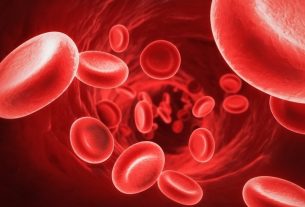Anemia can cause symptoms such as tiredness, paleness, hair loss or weak nails and, when identified through blood tests, doubts may arise as to whether it could indicate a more serious illness or put the person’s life at risk.
Normally, anemia is confirmed when hemoglobin levels in the blood are lower than 13.5 g/dL in men and 12 g/dL in women, being more common in the elderly and people who consume alcohol in excess, for example. Understand better what anemia is.
Although anemia does not turn into leukemia, it can be dangerous during pregnancy and, when severe, can be called profound, cause weight loss and put the person’s life at risk if not treated properly.

Some of the main doubts about anemia are:
1. Can anemia turn into leukemia?
No, anemia cannot turn into leukemia. What happens is that anemia can be a symptom of this other disease, and it is important to identify the cause of the anemia to make sure it is not being caused by leukemia.
Leukemia is a disease that can impair the functioning of the bone marrow, which is the organ responsible for producing blood cells, causing anemia when it leads to a decrease in the production of red blood cells. Know the symptoms of leukemia.
2. Is anemia during pregnancy serious?
Having anemia during pregnancy can sometimes be serious, because it can interfere with the baby’s development and increase the risk of premature birth, for example.
Although anemia is common during pregnancy, it is important that it is identified and treated according to the obstetrician’s guidance, and the use of iron supplements, for example, may be indicated. See how anemia is treated during pregnancy.
3. Does anemia make you gain weight or lose weight?
A lack of hemoglobin in the blood is not directly linked to weight gain or loss. However, anemia’s symptom is a lack of appetite, which could cause weight loss at the same time as there are nutritional deficiencies.
Furthermore, iron supplements can cause constipation and this can make the belly more bloated, giving the feeling of weight gain. Therefore, it is important to consume more fiber and drink more water during anemia treatment to soften stools and avoid this side effect.
4. What is profound anemia?
A person has anemia when hemoglobin values are below 12 g/dL in women and below 13.5 g/dL in men. Furthermore, when values are below 7 g/dL it is said that the person has profound anemia and the symptoms of anemia, such as tiredness and paleness, tend to be more easily noticed.
5. Can anemia lead to death?
The most common anemias in the population, which are iron deficiency and megaloblastic, do not lead to death, on the other hand, aplastic anemia, which is a type of genetic anemia, can put a person’s life at risk if not properly treated, as it is common for people to have recurrent infections, compromising immunity.
6. Does anemia only happen due to a lack of iron?
No. Although a lack of iron is one of the main causes, anemia can also be caused by a deficiency of vitamin B12 in the body, having an autoimmune or genetic origin, for example.
Therefore, it is important to carry out blood tests, in addition to evaluating the blood count, to identify the type of anemia and, thus, begin the most appropriate treatment. Learn about the main types of anemia.
7. Is it possible to identify anemia through the eyes?
Anemia can sometimes be identified by the eyes, especially when it causes paleness in the conjunctiva or the inside of the eyelids. Additionally, depending on the type of anemia, the eyes may also turn yellow.
However, it is only possible to confirm the diagnosis of anemia through blood tests, such as a blood count, which can show changes in hemoglobin levels in the circulation. Find out more tests that confirm anemia.
8. Can black stools indicate anemia?
Black stools typically do not indicate anemia. However, they can sometimes be indicative of blood loss which, depending on its cause, amount of blood lost and duration, can lead to anemia. Check out the main causes of black stools.
9. Is anemia curable?
Anemia can be cured in some cases, especially when it occurs due to nutrient deficiency, such as iron and vitamin B12. Therefore, in the case of anemia, it is important to identify its cause so that the doctor can recommend the most appropriate treatment.
Bibliography
- STATPEARLS. Anemia. 2022. Available at: <https://www.ncbi.nlm.nih.gov/books/NBK499994/>. Accessed on January 5, 2023
- CASCIO, Michael J; DELOUGHERY, Thomas G. Anemia: Evaluation and Diagnostic Tests. . . . North Am Clin Med. Vol.101, n.2. pp. 263–284,

Sign up for our newsletter and stay up to date with exclusive news
that can transform your routine!
Warning: Undefined array key "title" in /home/storelat/public_html/wp-content/plugins/link-whisper-premium/templates/frontend/related-posts.php on line 12
Warning: Undefined array key "title_tag" in /home/storelat/public_html/wp-content/plugins/link-whisper-premium/templates/frontend/related-posts.php on line 13



